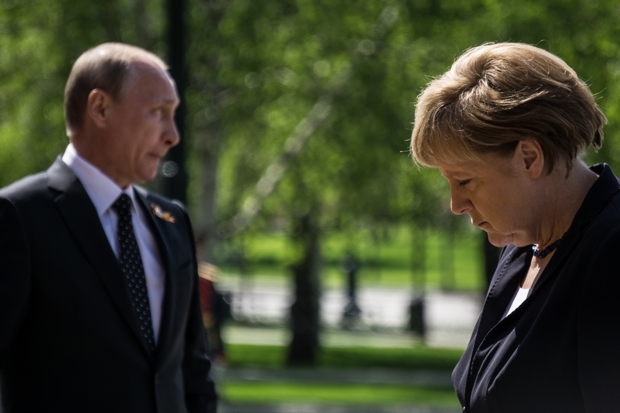We all know that relations with Russia are at their lowest ebb since 1991, when Boris Yeltsin brought down Communism during one of his alcoholic blackouts. What’s becoming increasingly clear, though, is that there is a new ideological cold war – and I’m not sure we’ll win this one.
The German approach to dissent over these past few months has been revealing. Earlier this month, a leading eurocrat chided the Hungarians for refusing to accept that ‘diversity is inevitable’, using that strange Marxist language these people love. Another accused that small central European country of being ‘on the wrong side of history’. Meanwhile Angela Merkel compared those who lock others out to the Communists who once locked their own people in.
It is not just that Germany wants central Europeans to accept refugees for convenience sake, or for humanitarian reasons; it is that the West now defines itself by the ideology of multiculturalism. To be a European is to believe that national borders are a thing of the past and ‘diversity is inevitable’.
In contrast to the West, Russia is increasingly identified by an old-fashioned idea of nationhood, while its foreign policy is based on the Westphalian concept of sovereignty (even if they are not always in practice respectful of their neighbours’ borders). Last month Russia held a ‘sovereignty conference’ in which various separatist groups – some by the looks of it total fantasists – were invited to talk about their plans for the future.
So the East-West divide this time is not between capitalism and communism, nor even democracy and authoritarianism, but multiculturalism and sovereignty.
Just as the US led the liberal democracies against Communism, so it is the most idealistically multicultural country. America now identifies itself as a ‘proposition nation’ and being American is not characterised by any historical attachment to the country. Despite what people assume, this a relatively recent idea; ‘nation of immigrants’ did not become a common phrase until JFK’s time.
Across western Europe the establishment now accepts multiculturalism as the state creed, with Merkel employing a task force to arrest people who make disparaging comments about migrants on Facebook, while the current government’s ‘British values’ agenda identifies Britishness not by history, but a set of political beliefs.
This is, of course, how the Soviet Union marked membership of their polity, and ironically it is now the West that has adopted a utopian creed – one in which, rather than possessions being shared by humanity, nations are. I wonder if this has ever occurred to Chancellor Merkel when she tells off the small nations of central Europe.
Who will win this new cold war? The West had a huge head start, but it’s certainly true that multicultural states are more vulnerable than those that believe in older ideas of nationhood. Since the Immigration Act was passed 50 years ago, America has become internally a far weaker country; trust has declined sharply, a sure sign of declining social capital, while politics has become more extreme and bitter. The America of 2015 would be far less equipped to face a major world rival than the America of 1965 or 1941; that, I believe, is a direct product of the idea of a proposition nation.
Likewise Europe is not strengthened by the cult of diversity, as the last few months have illustrated. Central European nations, seeing what has happened in London, Paris and Malmo, are put off by multiculturalism. Meanwhile large minorities – if not majorities – of western Europe still believe in a more traditional idea of nationhood, one not defined by ‘values’ but by the paradoxically more liberal definition of history and borders.
All of this puts western conservatives in a difficult position, being not just out of step with polite opinion but at risk of being identified with our political enemy.
Putin runs a thuggish regime, whose enemies tend to kill themselves accidentally in mysterious circumstances. Its nationalism (not to mention its view of homosexuality) is unpleasant. Russia’s is a conservatism without western political institutions, but in its attachment to tradition, Christianity, sovereignty and posterity, it looks superficially closer to Burkean conservatism than western politics. This is probably bad news for conservatives. After all, if we like Russia so much, why don’t we go and live there?







Comments